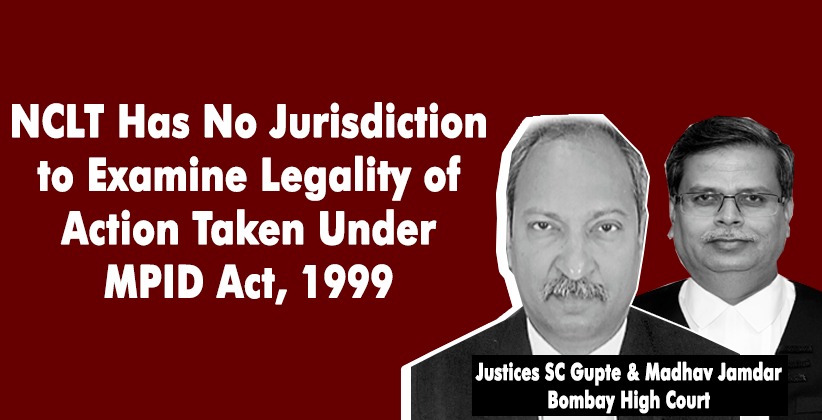The NCLT has no jurisdiction to examine the legality or validity of action taken under MPID Act, 1999 as per the Bombay High Court. It said that it is only the designated Court constituted under Section 6 if the said act that will have exclusive jurisdiction to deal with the same.
Division bench consisted of two judges: Justice SC Gupte and Justice Madhav Jamdar. The order dated January 28, 2019 was quashed and set aside the passed by the Member (Judicial), NCLT, Mumbai Bench and they directed to de-freeze the bank account in the name of Dunar Foods Ltd, which was freezed in relation to the National Spot Exchange Limited (NSEL) payment default crisis.
An electronic platform for spot trading in commodities was provided by The NSEL and used to operate from 16 states across the country. This was named as 63 Moons Technologies Pvt Ltd. and was promoted by FTIL, which holds 99.99% of the share capital of NSEL.
The National Agricultural Cooperative Marketing Federation of India Ltd (NAFED) held the balance 0.01% of the share capital of NSEL.
On September 30, 2013, MRA Marg Police station filed an FIR against 63 Moons Technologies Ltd, NSEL, the Directors and Key Management Persons of FTIL and NSEL, borrowers/trading members of NSEL, some brokers of NSEL and others, under sections 120B, 409, 465, 467, 468, 471, 474m 477(A) of IPC, 1860.
It was alleged in the FIR that NSEL had caused wrongful loss of approximately Rs. 5600 crores to more than 13000 investors. The investigation into the said case was transferred to Economic Offence Wing, Mumbai on the same day.
Huge funds from the NSEL were obtained against non-existent stocks of commodities as per the FIR. There was a semblance of trading, which was actually being done in non-existent goods, by issuing forged warehouse receipts.
The warehouse was required to be deposited in the exchange designated and certified warehouses as part of the pay-in obligations, lacked capacity and some of them had no stocks.
A settlement schedule in August 2013, was announced by the NSEL spread over 30 weeks for pay-out on a pro-rata basis to 148 members but it defaulted in all the payouts since the announcement of the settlement plan.
For the defaulted financial debt of over Rs. 758 crore outstanding against M/s. Dunar Foods Ltd, on June 27, 2017, the State Bank of India, a Finance Creditor of M/s. Dunar Foods Ltd., invoked the jurisdiction under Section 7 of the Insolvency and Bankruptcy Code, 2016.
The NCLT and Anil Kohli admitted the petition and he was further appointed as Insolvency Resolution Professional and directed to comply with provisions of Section 13 and 15 of IBC.
On February 20, 2018, application was filed by Dunar Foods Ltd. Through IPR under Section 9 of MPID Act before the Designated Court under MPID Act, seeking direction to defreeze their bank accounts.
The said application was rejected by order dated 28th December, 2018, by Special Judge (MPID Act) City Civil and Sessions Court for Greater Bombay,.
A miscellaneous application on 12th November, 2018, was filed by IPR for Dunar Foods Ltd. under section 60(5), 14(1a) and 74(2) of IBC before the NCLT, seeking direction to defreeze the said account of the corporate debtor by the impugned order dated 28th January, 2019, passed by NCLT, Mumbai Bench, de freezing of the said account was allowed. The said order is challenged by the State of Maharashtra.
The Insolvency and Bankruptcy Code, 2016 as well as the MPID Act, 1999 was examined by the bench along with various judgement.
The Court said, it is clear that the appropriate forum to challenge the attachment of the account of the Respondent is the Designated Court under MPID Act where the Respondent can raise all contentions on merits and also can point out the provisions of IB Code and the effect of the same on the steps taken under the MPID Act. It will be for the MPID Court to consider the interplay of the provisions of the MPID Act and the IB Code and rule on the matter.
The Court said, Thus, in view of the above discussion, we hold that the NCLT has no jurisdiction to examine legality or validity of action taken under MPID Act and it is only the Designated Court constituted under Section 6 of the MPID Act that will have exclusive jurisdiction to deal with the same. Therefore, the impugned order passed by the NCLT is without jurisdiction and therefore, amenable to a challenge in our writ jurisdiction.








